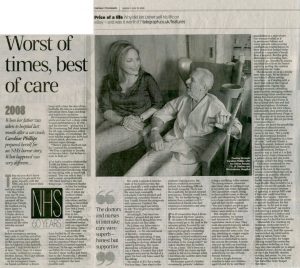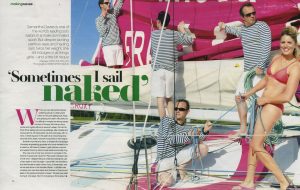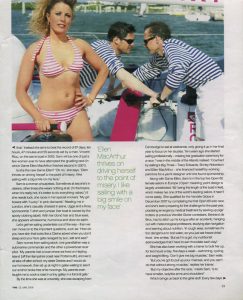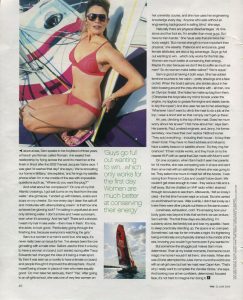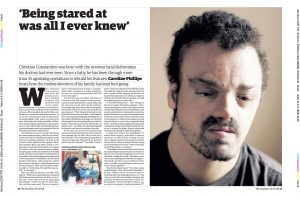Worst of times, best of care
The Telegraph | 30 Jun 2008
When her father was taken to hospital last month after a car crash, Caroline Phillips prepared herself for an NHS horror story. What happened was very different.
View cutting image View PDF View transcript
When her father was taken to hospital last month after a car crash, Caroline Phillips prepared herself for an NHS horror story. What happened was very different.
“The doctors and nurses in intensive care were superb – honest but supportive”
They say you don’t know what you’ve got until it’s gone. Equally, with the NHS, you don’t know what you’ve got until you need it.
On May 9 this year, my 79-year-old father, Ronald, careered off the M4 at over 70mph. He hurtled across three lanes on a busy Friday at 2.30pm, down a verge and hit a tree. Miraculously he missed all the other vehicles around him.
It was an hour before emergency services were able to cut him out of his car; then a helicopter landed by the motorway and airlifted him to Oxford’s John Radcliffe Hospital. I only heard about it at 4pm. “Dad’s been in a major car crash,” sobbed my younger brother, Simon. “He’s got serious head and leg injuries …”
In the emergency room, we found our father: a frozen lump with a face the size of two footballs. He was on a ventilator, sprouting wires, bags and drips and tethered to monitors. He’d sustained fractures to his pelvis and one foot, a deep ankle wound and fractures to 10 ribs and his sternum – giving him a life-threatening flail chest [where the rib cage compresses, rather than expands, on breathing]. We were told he might also have had a heart attack, plus brain and internal organ damage.
“There’s only so much we can do,” warned the anaesthetist. “We’ll try to get him to breathe on his own later – but he has to want to help us.”
I’ve had a complex relationship with my father, a sometimes tricky, adorably eccentric and essentially kind family man. Now he was dying, with so much left unsaid. “You can talk to him,” said a nurse, sympathetically. “We think hearing is the last thing to go.” I whispered thanks to him for looking after me since I was 13 when my mother bolted; for my great education; and for being an incredible grandfather. I told him that I loved him. I begged him to live.
But standing amid the artificially ventilated bodies with my anguished half-sister, Dara, I was terrified – my fears fuelled by all the scare stories I’d read about the NHS. Weren’t these doctors exhausted and incompetent? Wasn’t Dad destined for a hospital-acquired infection? At his age, wouldn’t our father be a low priority? Wouldn’t these medics just leave him to die? Frantically, I phoned consultant friends in London, trying to engineer the best possible care.
Yet, while I panicked over the state of the health service, the John Radcliffe’s staff worked with professionalism and dedication. We were kept constantly informed. A doctor phoned and briefed my consultant friend so that I could discuss the prognosis with someone I trusted; the anaesthetist urged our family to eat: “You’ve got a long night ahead of you.”
At midnight, Dad went into theatre. I prayed that my elder brother, David, flying from New York, would see him alive.
By 2.30am our father was in intensive care (ICU), off his ventilator – to the astonishment of doctors – conversing intelligently and joking. It was a miracle. And surreal. He had, according to doctors, defied all odds by surviving. The nurse showed me a Polaroid of his car, a Toyota. It looked like a foil wrapper crunched in the fist of a giant. He had only been saved by his airbag.
He stayed in ICU for a week. For four days, Dara slept in the relatives’ waiting room. My father’s condition remained critical, his breathing difficult, his heart irregular. There was the possibility he would contract pneumonia. Then he would have died. “It’s far harder being a relative than a patient in ICU,” remembered David, who had experienced intensive care after a spinal operation.
For 17 consecutive days, I drove the round trip from London. (In order to fit everything in, Simon would get to his desk in the antiques gallery founded by our father, at 5am.) It was physically and psychologically exhausting. Illness aside, Dad’s occasional morphine-induced confusion was frightening. “Did you put my V&A invitation in the orange juice?” he asked. Another time he smiled: “I’m on a boat.” (He’d been on a bedpan.) With the stress, my hair started to fall out in clumps; when I told Dara she said the same had happened to her.
We became part of a hidden community, patients’ relatives riding a terrifying roller-coaster. The young woman, careworn after three days of waiting to see if her sister was brain-damaged. The Lancashire couple, living in their mobile home in the car park, and despairing for their son whose pancreatic operation had left him on life support. “You don’t expect people to get infections in hospital,” said his father, tears welling in his eyes.
But, despite all my preconceptions, the nurses and doctors in ICU offered superlative medical care. They were also psychologically astute, honest but supportive. They always went the extra mile. One day, attaching an oxygen supply and face mask, they put our father in a wheelchair to enjoy the sun on the terrace. A nurse also put up with our touching belief in alternative therapies – decrying it as anecdotal, while authorising our use of Bach Rescue Remedy.
It was a tough decision whether to take our children, aged 12 and 10, to visit their grandfather at a unit where one woman wailed as if in permanent labour and many patients were wearing contraptions (metal halos) on their heads that looked better suited to a carpenter’s bench than a hospital. But the girls, distressed at not seeing him, wanted to go. Sensitively, nurses shielded them from the brutal sights by pulling the curtains around patients’ beds.
The demands on us as a family have been high. We’ve divided our father’s affairs among ourselves – as if dealing with a death but without the funeral arrangements. Paying bills, sorting insurance, cancelling appointments, arranging visitors, researching future medical care, taking him food and tending his dog, Pingu, who’d been in the accident with him and had a ruptured spleen. (A witness whisked him to the vet’s where, unbelievably, they performed an emergency splenectomy. Pingu is 14 – 98 years old in human terms – but his old age did not preclude treatment either.)
And as we faced the possibility of parental abandonment, rivalry, stresses and strains came to the fore. “It’s a myth that dysfunctional families suddenly pull together in a time of crisis,” said one friend, a family therapist. Instead, events have highlighted our family’s maladjustments. Perhaps a positive way to look at it is that we’ve had a dress rehearsal for a parent dying and can make changes before the final curtain.
Our father remained for two weeks in the trauma ward, one of the best in the country, where overstretched staff are as attentive as possible, efficient and reassuring. His private health insurance policy with Saga Health Plan proved to be a saga: he’d paid thousands, but at a lower premium because of agreeing to accept NHS care if the state could treat him within four weeks – thereby effectively nullifying his access to private healthcare for this condition. So he had to wait to be “repatriated” (as medics dub moving a patient to their local hospital) to Chelsea and Westminster on the NHS, as there wasn’t a bed for two weeks.
Meanwhile I’m counting my blessings. Sixty years since it began, we’ve experienced the NHS at its best. And this episode has enriched my relationship with my father. There’s the chance to love him for longer. His dog visited him yesterday: one patient hobbling on four legs, the other unable yet to stand unaided on two. Above all, staff at the John Radcliffe deserve nothing but praise. So, too, our father who, thanks to the NHS, has foiled the Grim Reaper this time.


